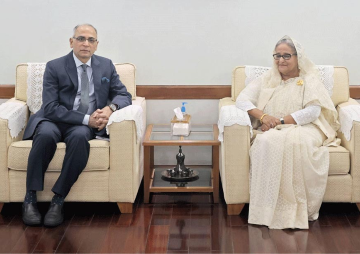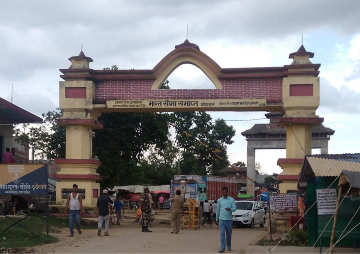Kashmir is in trouble. Several incidents in quick succession that shattered peace in the State over the past few weeks are ominous. Trouble brewing in the Middle East, the regrouping of the Al Qaeda and various elements of terror groups, their re-emergence from the badlands of Afghanistan and Pakistan and the rising crescendo of bickering within Pakistan-all of this poses a serious threat to peace and stability in the region and elsewhere.
Let us look at Kashmir first. Early this year, a genuine initiative was taken by Prime Minister Atal Bihari Vajpayee to whittle down months of bitterness and open hostility with Pakistan by offering a comprehensive peace package. Though Islamabad#146;s military regime was slow to respond and required prodding from the West to follow suit, the Vajpayee Govern-ment put in place several confidence-building measures, including a troops redeployment along the Line of Control (which could be more appropriately renamed the Line of Conflict).
Within Kashmir, the perpetual bone of contention, a democratically elected Government was making a valiant attempt to wipe away the bloodstains and tears left behind by more than a decade-old orgy of violence. Tourists were returning to the tranquil surroundings of the Dal lake. Business was flourishing. Even the All-Party Hurriyat Conference changed its guard and stance. Maulvi Abbas Ansari took over as the Hurriyat leader. This augured well for the Valley. The Maulvi is a Shia, a moderate in terms of Kashmir politics and known to express his views independent of Islamabad. It is this normalcy factor that is threatening to unravel the peace patchwork painstakingly created over the past 25 weeks in Kashmir.
Islamabad saw Kashmir slipping out of its hands. Without Kashmir, Islamabad would have no reason to exist. For Islamabad and its army, Kashmir is like the mythical pot of gold at the end of the rainbow. A peaceful Kashmir would mean the death of the very idea of Pakistan. The counter-offensive began in July. Syed Ali Shah Geelani was sent the message. A rabidly pro-Pakistan religious teacher, he broke ranks and split the Hurriyat. Geelani has always done Islamabad#146;s bidding, lending vocal support to terrorists and their agenda in the Valley.
During last year#146;s October elections in the State, it was Geelani who tried his best to derail the process by forcing the Hurriyat to boycott the polls and by running a tirade against the People#146;s Conference, a Hurriyat component, for tacitly backing the democratic process. The fact his ploy did not make the people budge from exercising their rights left Islamabad in a quandary.
A word or two about Geelani#146;s connections to Islamabad would not be out of place here. On July 30 this year, two Srinagar residents, Ghulam Mohammad Sheikh and Saifuddin Bhatt, were arrested for their hawala connections. In their confessional statements, they said they were entrusted with the task of passing on Rs 10 lakh to Geelani to help him float a parallel separatist outfit on the lines of the Hurriyat. Sheikh is a known hawala racketeer with a base in Kathmandu where, police officials say, he gets ample support from the officials of the Pakistani High Commission.
Evidence two: Geelani got his elder son admitted to a medical specialisation course at the PIMS Institute in Islamabad. Evi-dence three: During a raid on Geelani#146;s house on June 9 last year, income tax authorities seized currency worth $ 10000 and Rs 10.2 lakh, vouchers showing purchase of substantial amounts of jewellery, a diamond encrusted watch with the inscription "From Pakistan Government", and documents about property and vehicles. The seized documents and currency clearly showed Geelani was living well-in fact, beyond his means.
By his own admission, Geelani#146;s total annual income was Rs 17,100-Rs 7,100 as pension from the State Assembly (he is a former member) and Rs 10,000 as agricultural income. But an assessment made by the income tax authorities showed that Geelani spent close to Rs 1 lakh to Rs 1.5 lakh every month. He employed at least 15 servants and gave Rs 25,000 to his wife (her statement) for kitchen expenses.
The only reason I quote these facts and figures is to show that Geelani#146;s actions in splitting the Hurriyat were motivated and engineered by Islamabad, where plans are afoot to subvert the peace process and create, once again, an atmosphere of distrust and hatred.
The picture cannot be complete without factoring in the sudden spurt of violence in the Valley. The security forces are on attacking mode again. Serious attempts are being made to revive terrorism by staging fidayeen attacks on army camps, triggering blasts in crowded places and causing mayhem on festivals. One military camp has already been attacked. More are on the list.
A quick analysis of the fidayeen attacks on military camps would show that terrorists may soon target a big cantonment or an establishment in and around Srinagar. And in all probability, they would use explosive-laden vehicles (as in the past) to cause maximum damage and terror. Less protected Border Security Force encampments and bunkers would be primary targets. Likewise, sensitive targets in New Delhi are equally vulnerable in the coming festive season.
In the past few weeks, there has been an increase in intelligence chatter about the movements of terrorists and explosives to the Capital. There could be a serious attempt made to disrupt peace in the Capital and cause a feeling of terror and unquiet in the country. There is a strong possibility Islamabad will exploit communal tensions that are likely to erupt in the north and western parts of India following a renewed call given by fundamentalist organisations like the VHP to launch politically-motivated agitations.
The recent Mumbai blasts were an exercise of similar nature, except that they failed to trigger the reaction Islamabad had planned for. The blasts happened in the midst of one of the most passionately celebrated festivals in western India, the Lord Ganesh festival. The design was to trigger a communal backlash against Muslims in Mumbai and other cities and towns across Maharashtra, which would have effectively shut down India#146;s business Capital. The fact that it did not is testimony to the fortitude and wisdom of the common people who broke all religious and regional barriers to stand together in a time of crisis. (I am sure Islamabad would have seen the pictures of Muslim blood donors lined up at hospitals.) I strongly suspect there could be a renewed attempt to stoke communal fires across the country, especially in northern India, in the coming weeks.
Take another step backward and a larger conspiracy behind these blasts and fidayeen attacks as well as the Hurriyat split become visible. The ill-timed, ineptly executed war in Iraq has only galvanised terror groups which were on the run following the US onslaught since September 11, 2001.
There are now disturbingly clear indications that the Al Qaeda and Taliban have joined hands in Afghanistan and Pakistan to wage a war against the US-led forces in Afghanistan and Iraq. The increasing number of attacks on the coalition forces in Iraq is an early indicator of this trend. Though there has not yet been a spectacular attack on Western targets after 9/11, it will be naïve to rule out such a possibility in the future.
In fact, the newly emerging terror networks are planning for a longer battle with the Western forces to prove a point: They could defeat the US forces on the ground, like they seem to have done in Afghanistan. This could mean continuing material and moral support to these elements from countries sympathetic to their cause. Pakistan, by all available evidence, is one such state which continues to support, shelter and harbour terrorist groups and potential terrorists. The renewed violence in Kashmir and elsewhere in India is part of this bigger plan.
The views expressed above belong to the author(s). ORF research and analyses now available on Telegram! Click here to access our curated content — blogs, longforms and interviews.




 PREV
PREV

